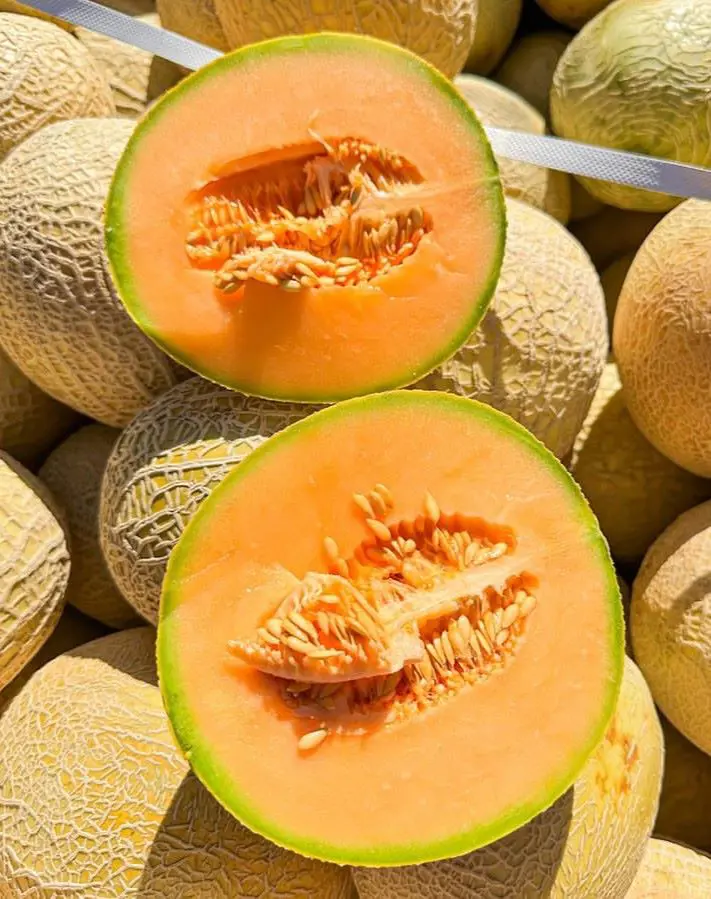Cantaloupe Nutrition Facts and Health Benefits

With summer approaching, the harvesting season for exotic fruits like cantaloupe is also arriving soon. Cantaloupe is a type of melon renowned for its sweet, juicy flesh and distinctive aroma.
This fruit appeals to a wide range of palates, making it a favorite ingredient in fruit salads, smoothies, desserts, and snacks. Today, we look at the nutritional information on cantaloupe along with its several benefits.
Cantaloupe Nutrition Info
Also known as "muskmelon", cantaloupe is a nutritiously rich fruit vitamins, minerals, and antioxidants. It is a good source of vitamins A and C, which are essential for immune function, skin health, and vision.
According to USDA FoodData, cantaloupe contains over 90% water. Its water content, 90.2 grams per 100g is only slightly lower than that of the watermelon.
Cantaloupe Melon Nutrition Facts
Here are the nutrient contents per 100 grams of cantaloupe:
- Calories: 34 kcal
- Water: 90.2 grams
- Protein: 0.84 grams
- Carbohydrates: 8.16 grams
- Sugars: 7.86 grams
- Dietary Fiber: 0.9 grams
- Fat: 0.19 grams
- Vitamin A: 3382 IU (equivalent to 169 mcg of Retinol Activity Equivalents - RAE)
- Vitamin C: 36.7 mg
- Vitamin K: 2.5 mcg
- Folate (Vitamin B9): 21 mcg
- Potassium: 267 mg
- Magnesium: 12 mg
- Calcium: 9 mg
- Phosphorus: 15 mg
- Sodium: 16 mg
1. Protein
Cantaloupe is not a significant source of protein compared to animal products or legumes. However, it still contains a variety of amino acids essential for the body's functions.
The proteins in cantaloupe are primarily made up of small amounts of various essential and non-essential amino acids. Essential amino acids are those that the body cannot synthesize on its own and must be obtained through the diet. However, you should remember that cantaloupe alone cannot meet daily protein requirements.
2. Carbohydrates
Cantaloupe is a low-calorie fruit with a minimal carbohydrate content. These carbohydrates are primarily composed of natural sugars, such as sucrose, fructose, and glucose.
In addition to sugars, cantaloupe contains 0.9 grams of dietary fiber per 100 grams. The fiber in cantaloupe aids in digesting food and maintaining a healthy gut.
3. Vitamin A
The melon's nutritional information cantaloupe suggests the Vitamin A level in cantaloupes to be 3382 IU per 100 grams. The fruit is rich in beta-carotene, a powerful antioxidant and a precursor to vitamin A.
Once consumed, beta-carotene is converted into retinol, the active form of vitamin A, in the small intestine. This conversion process is regulated by the body based on its vitamin A needs.
4. Vitamin C
Vitamin C is a water-soluble vitamin synthesized in the fruit through the conversion of glucose into ascorbic acid. Cantaloupe is an excellent source of vitamin C, providing 36.7 mg per 100 grams.
The recommended daily intake of vitamin C is about 65-90 mg, so a 100-gram serving of cantaloupe can supply around 40-60% of this requirement. Regular consumption of cantaloupe can significantly contribute to meeting daily vitamin C needs, supporting overall health and well-being.

5. Potassium
Cantaloupe contains 267 mg of potassium per 100 grams, making it a good source of this essential mineral. The potassium is distributed throughout the flesh of the fruit, which is the part typically consumed.
Potassium plays a vital role in maintaining proper cellular function, regulating fluid balance, and supporting nerve and muscle function. Including cantaloupe in your diet can help ensure you meet your daily potassium needs.
6. Magnesium
Magnesium is a crucial mineral involved in over 300 biochemical reactions in the body. Cantaloupe provides 12 mg of magnesium per 100 grams, significantly contributing to the daily magnesium intake.
To maximize magnesium intake from cantaloupe, consume it fresh and in larger portions, such as in fruit salads or smoothies. Pairing cantaloupe with other magnesium-rich foods can help ensure you meet the recommended melon cantaloupe nutrition requirement.
7. Folate (Vitamin B9)
Folate is a water-soluble vitamin significant for cell division, DNA synthesis, and red blood cell formation. Cantaloupe contains approximately 21 mcg of folate per 100 grams.
Vitamin B9 is especially important during periods of rapid growth and development, such as pregnancy, infancy, and adolescence. It is essential for the proper development of the fetal brain and spinal cord, helping to prevent neural tube defects.
Cantaloupe Health Benefits

Cantaloupe has won over health-conscious individuals with its several health benefits. The sweet melon is also relatively cheap, considering the nutritional value of cantaloupe.
From aiding in digestion to weight management, here are some of the many benefits of including cantaloupe in your diet.
1. Aids In Weight Management
Cantaloupe is a great option for those looking to reduce calorie intake. Added to its high water content, it promotes feelings of fullness and satiety, thus reducing overeating.
Additionally, cantaloupe's natural sweetness satisfies cravings for sugary treats, potentially curbing the consumption of higher-calorie snacks. Overall, cantaloupe's low-calorie density, and high water and fiber content make it an excellent part of a balanced diet.
2. Provides Hydration
Cantaloupe stands out as one of the best fruits for summer due to its exceptional ability to hydrate the body. As the fruit is over 90% water, its consumption helps replenish fluids lost through perspiration during hot weather or physical activity.
Each juicy bite provides a refreshing burst of hydration, aiding in maintaining optimal hydration levels and preventing dehydration.
3. Improves Eyesight
Rich in beta-carotene, cantaloupe promotes optimal vision by supporting the health of the retina and other structures within the eye. Once consumed, beta-carotene is converted to vitamin A, essential for maintaining good vision in low-light conditions.
Adequate intake of vitamin A helps prevent eye disorders like night blindness and age-related macular degeneration. Additionally, cantaloupe's high vitamin C content acts as an antioxidant, protecting the eyes from oxidative stress and reducing the risk of cataracts.

4. Supports Immunity
Cantaloupes offer immunity-supporting qualities through their rich nutrient profile, particularly their high content of vitamin C and beta-carotene. Vitamin C strengthens the immune system by enhancing the function of immune cells, such as lymphocytes and phagocytes.
The beta-carotene in cantaloupes also aids in regulating immune function by supporting the integrity of mucous membranes.
5. Promotes Heart Health
Potassium in cantaloupe regulates blood pressure by counteracting the effects of sodium. It helps in promoting vasodilation and also reduces the risk of hypertension.
Maintaining healthy blood pressure levels is crucial for preventing cardiovascular diseases such as heart attack, stroke, and heart failure. Furthermore, potassium supports proper heart rhythm by aiding in the transmission of electrical impulses in cardiac muscle cells.
6. Aids In Digestion
The cantaloupe melon is a great choice for a snack, especially if you suffer from digestive issues. The combination of water and fiber helps promote hydration and supports regular bowel movements, alleviating constipation.
Additionally, the natural sugars in cantaloupe are easily digestible and gentle on the stomach. Its refreshing taste and low acidity further minimize the likelihood of digestive discomfort.
7. Makes Bones Stronger
According to the nutritional information for cantaloupe, the summer fruit promotes healthier bones through its vitamin K content. Vitamin K is vital in bone metabolism by assisting in the modification of proteins involved in calcium binding.
Moreover, the potassium, magnesium, and vitamin C in cantaloupes also contribute to bone health. Potassium helps neutralize acids in the body that can leach calcium from bones, while magnesium supports bone density.
8. Has Antioxidant Properties
Cantaloupes contain various antioxidants, including vitamin C, beta-carotene, and other phytonutrients like flavonoids and polyphenols. These antioxidants are vital in protecting the plant and its fruit from oxidative stress caused by environmental factors such as UV radiation, pathogens, and pollutants.
For the plant, antioxidants help prevent damage to cellular structures, maintain photosynthetic efficiency, and enhance defense mechanisms against pathogens and environmental stressors.
Meanwhile, the fruit receives its vibrant color, flavor, and aroma from antioxidants. Overall, they help neutralize harmful free radicals in the body, reduce inflammation, support immune function, and lower the risk of chronic diseases like cancer, heart disease, and neurodegenerative disorders.
Cantaloupe Allergies
While cantaloupes are generally safe for most people, some people may be allergic to proteins found in cantaloupes. Allergy symptoms include itching, swelling of the lips, tongue, or throat, hives, or even anaphylaxis in severe cases.
These people are most susceptible to cantaloupe allergies:
- Individuals with oral allergy syndrome (OAS).
- People with latex allergy.
- People with a history of severe allergic reactions, such as anaphylaxis.
- Individuals who experience allergic reactions to other fruits may be more likely to develop allergies to cantaloupes.
When To Avoid Cantaloupes?
As evidenced by the different allergies associated with the fruit, cantaloupes are not for everyone. If you have suffered from any of the allergies mentioned above, it's best to avoid them.

Further, there are more health conditions that might cause an adverse reaction to consuming the melon.
- Gastrointestinal Issues: Individuals with digestive issues such as irritable bowel syndrome (IBS) or gastroesophageal reflux disease (GERD) may need to avoid these acidic fruits that can exacerbate symptoms.
- Immunosuppression: People with compromised immune systems, such as those undergoing chemotherapy or organ transplant recipients, should avoid consuming raw fruits like cantaloupes. Eating this fruit may harbor harmful bacteria and pose a risk of foodborne illnesses.
- Pregnancy: Pregnant individuals should exercise caution when consuming cantaloupes due to the risk of foodborne illnesses like listeriosis, which can have severe consequences for both the mother and the fetus. It's essential to wash and handle cantaloupes properly to reduce the risk of contamination.
Varieties of Cantaloupes

Cantaloupes are primarily classified into two main types. The division is based on their geographic origins and different characteristics:
1. European Cantaloupe
Also known as the Cucumis melo var. cantalupensis, this variety has ribbed, gray-green skin and sweet, orange flesh. It is named after Cantalupo, Italy, where it was first cultivated in Europe. European cantaloupes are known for their aromatic flavor and juicy texture.
2. North American Cantaloupe
Often simply referred to as cantaloupe in the US and Canada, this variety features a net-like, rough rind with sweet, orange flesh. It is the most commonly found type in North America and is appreciated for its slightly milder flavor compared to its European counterpart.
Within these two primary types, there are numerous cultivars and hybrids, each bred for specific traits such as size, sweetness, texture, and disease resistance. Some of these varieties include Athena, Hale's Best Jumbo, Earli-Dew, Tuscan, and more.
Recent posts
Nutrition
Nutrition
Licorice Root: Benefits And Uses
You can spell it liquorice or licorice; this herb or root has been in use for centuries in most medicinal applications, as a natural sweetener and to enhance flavors. Regarding its origins, it comes from the root of the "Glycyrrhiza galbre" plant and...
Nutrition
Is Salmon Good For You? Nutritional Facts and Benefits
Salmon fish is a staple diet throughout the world, popular as a super food for its nutrients. Whether savored in sushi, poached, grilled, roasted, or pan-fried, salmon offers minerals and vitamins that contribute to healthy bodily functions. In addit...
Nutrition
25 Smoked Salmon Recipes That You Will Enjoy
Salmon is a silver-colored fish that is loaded with many nutrients, vitamins, and omega-3 fatty acids. Smoked Salmon is better for improving your health and reducing the risk of cancer, heart-related diseases, fights inflammation, reduces anxiety and...
Nutrition
Are Sausages Healthy? Nutrition And Health Benefits
Sausages are tasty in an addictive way, making them one of the most popular foods worldwide. You may have enjoyed this convenient food often, whether on a bun with mustard or grilled on a barbecue, the simple preparation methods are what makes its co...
Nutrition
20 Vegetables That Are Rich In Iron
Iron is essential for our bodies to function well. When we don't get enough iron, we often feel weak and tired. It's important to address iron deficiency early by eating the right foods. Fortunately, many vegetables are rich in iron and can help prev...
Nutrition
15 Cauliflower Nutrition Facts And Health Benefits
Cauliflower, a cruciferous vegetable, resembles a white variation of its relative, broccoli. Like broccoli, it has closely bunched florets attached to a thick core, often surrounded by a few leaves. While white is the most common color, cauliflower i...







